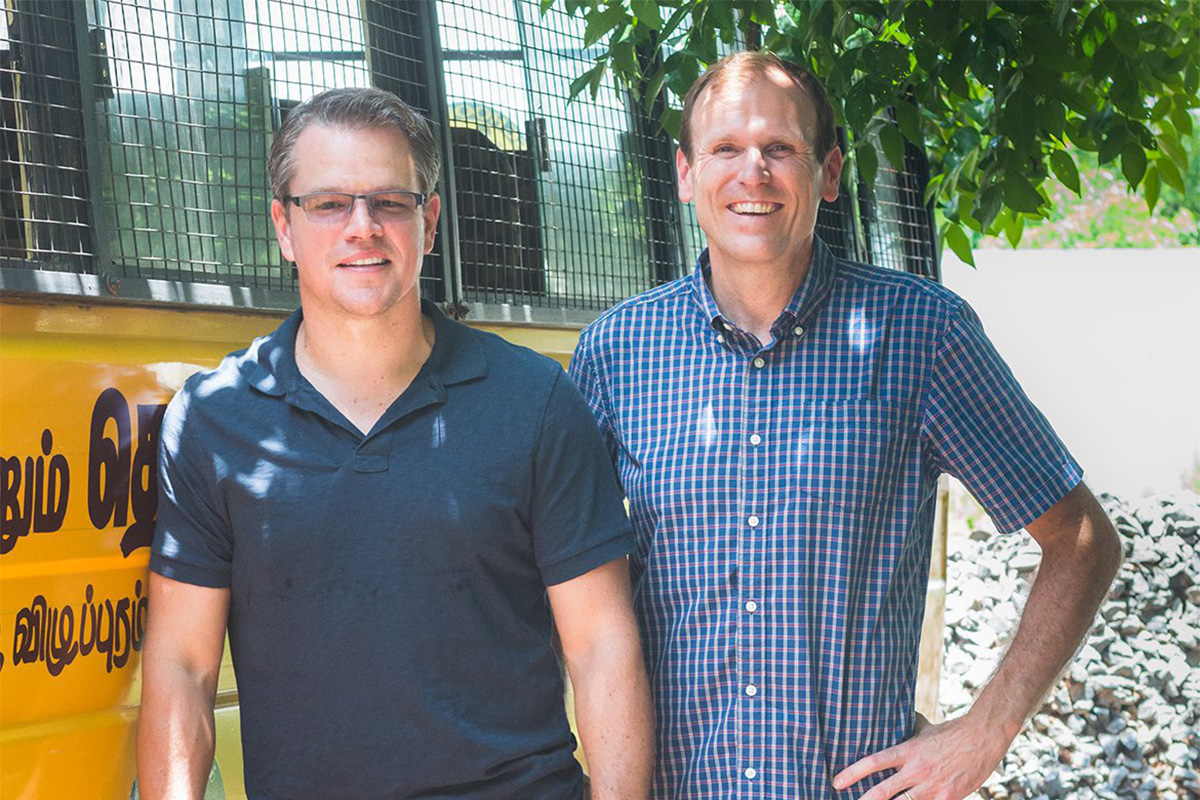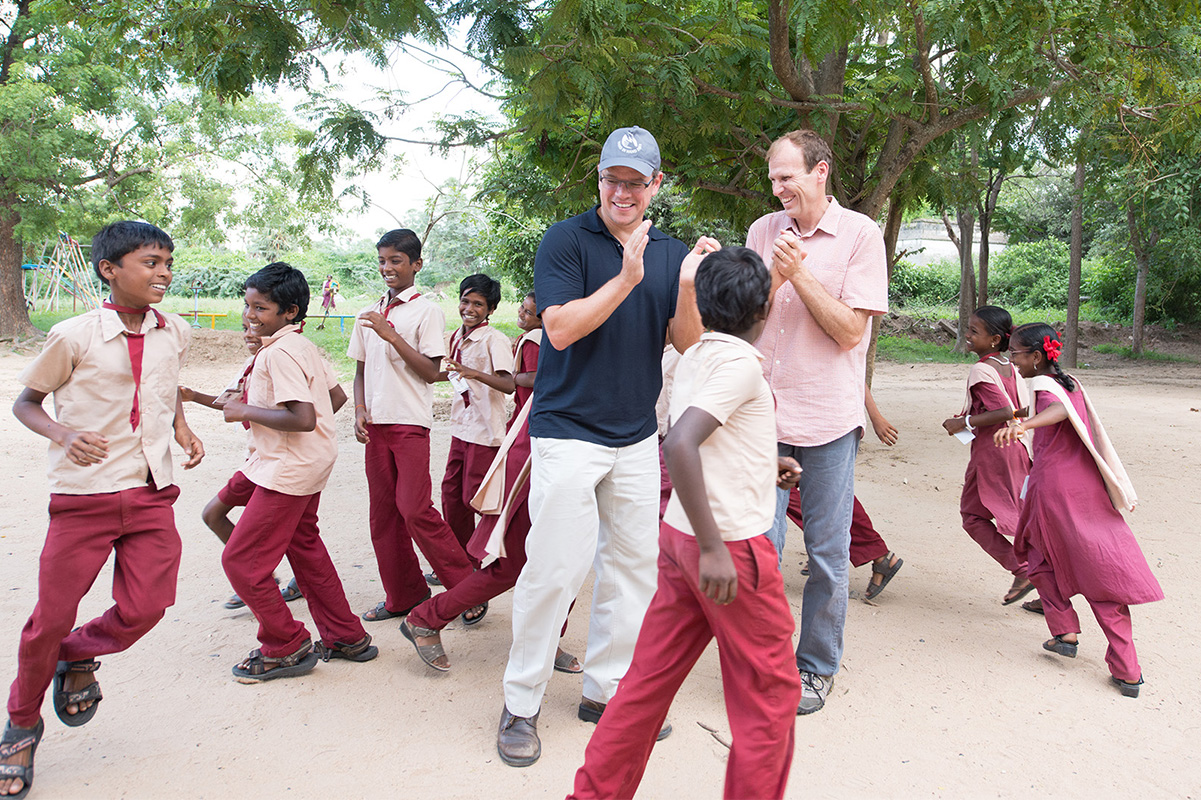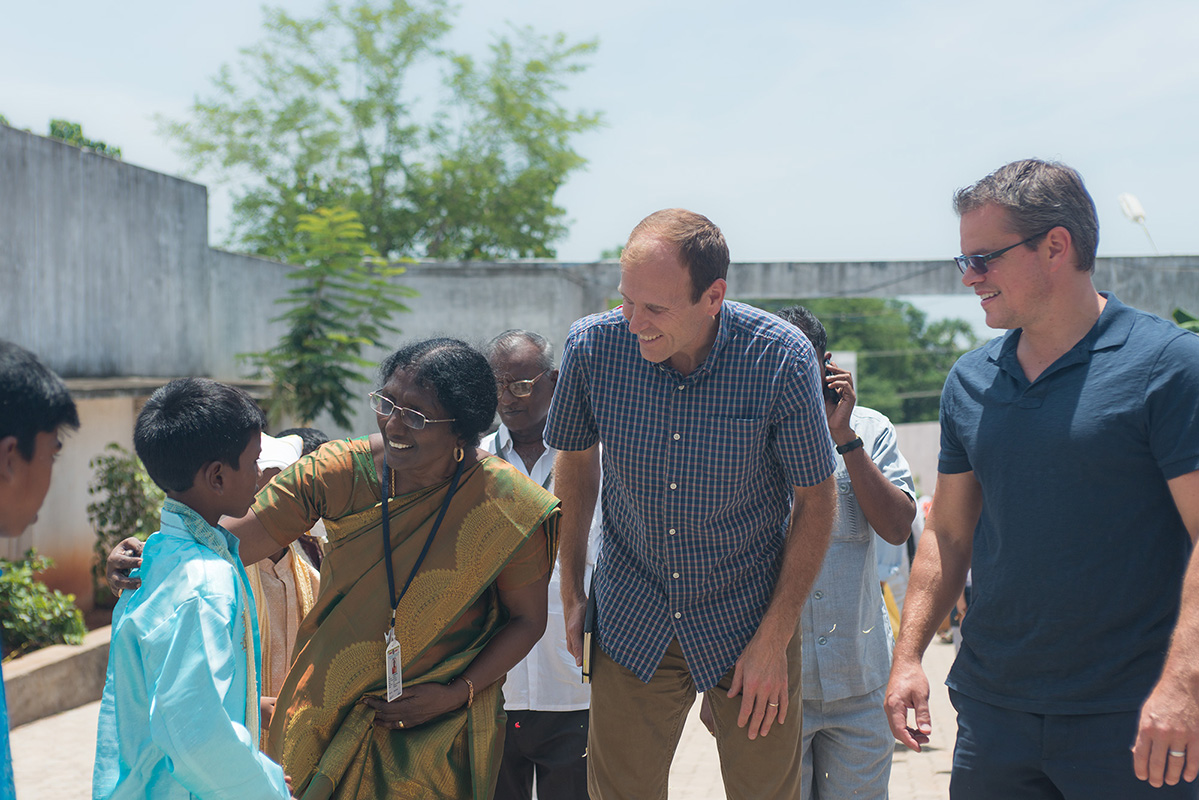This website uses cookies so that we can provide you with the best user experience possible. Cookie information is stored in your browser and performs functions such as recognising you when you return to our website and helping our team to understand which sections of the website you find most interesting and useful.
Exclusive: Oscar-winning actor Matt Damon tells Tempus how water could be a life-saving investment
By Michelle Johnson | 15 March 2018 | Culture, Wealth
As his production company champions inclusion riders at home, Matt Damon’s also making waves with his charity Water.Org

"If you don't know about the water crisis, you should." This is how Matt Damon first introduced Water.org's most ambitious project to date – WaterEquity. The actor and philanthropist has always been ahead of the curve – whether he's winning an Oscar for his debut screenplay Good Will Hunting (with Ben Affleck in 1997) or as an actor, breathing new life into the spy genre with his Jason Bourne series – but it's his humanitarian work that is truly making waves where the financial and philanthropic worlds collide.
Water.org was founded by Damon and entrepreneurial engineer Gary White in 2009 after the pair met at an international summit on global poverty, and merged their individual charities to deliver safe water and sanitation to developing countries. The organisation has since grown to be one of the world's leading charities tackling the water crisis, and their rising success – which Damon hopes will ensure that "everyone has access to safe water and the dignity of a toilet in our lifetime" – is all down to their innovative, fiscally-savvy approach.
"We know the water crisis can't be solved by a one-size-fits-all approach. Charity alone won't ever solve the problem," explained the 46-year-old actor. Instead, like his water-creating character in The Martian (2015), Damon looked for a more bespoke solution. He and White developed WaterCredit, a network of microfinance institutions providing small loans – $287 (£212) on average – that allow people to install their own safe water and sanitation facilities.
And it worked, so far reaching nearly eight million people around the world. Yet the organisation estimates there are 565 million people who can benefit from these microloans while maintaining the repayment rate of 99%, putting agency back into the hands of those who most benefit. The question is how to make up that $12bn (£8.9bn) demand. Enter, WaterEquity.
"So we asked another big question. What if we could connect the immense wealth that sits in investment portfolios around the world to this $12bn demand and channel it to solve the water crisis for everyone," said Damon. The concept seems simple. Socially-conscious investors put capital into WaterEquity social investment funds, which help finance enterprises including their accredited microfinance institutions across 13 countries. The investor gets a moderate return, or can re-invest to further their social impact. "The good news is that WaterEquity works. The first fund is in action already. Investors have put millions of dollars in the hands of those in need."
Tempus spoke exclusively to Matt Damon and Gary White about their innovative approach to charity, their projections for WaterEquity, and how investors and policy-makers can turn the tide on the global water crisis for good…
You co-founded Water.org in 2009, and the charity is now a global leader in access to safe water and sanitation. Where did it all start?
Matt Damon: Water is fundamental. It underpins everything. Visiting Zambia with Bono's team, meeting and talking to people in the villages taught me that safe water is a primary need. With access to safe water and sanitation, people have access to opportunity and can end the cycle of poverty in their lives.
Gary White: I started my first non-profit after a volunteer trip to Guatemala where I watched a ten year old girl in the slums walk through sewage to a barrel where she retrieved water for her family. The idea that this was people's reality hit me hard. I dug a little deeper and learned that in poor countries, people spend six hours a day, on average, gathering water. Some walking miles to rivers contaminated with animal waste. >>

How has the charity's focus grown over the years, and what are the issues you face?
Damon: One issue is the perception that poor people are unable to participate in the solution. There are cultural issues that we address through hygiene education and as a part of our programmes. However, ultimately lack of capital is the biggest barrier and the one we are solving.
White: Early on, we centered on working with local partners in developing countries to build water and sanitation systems. It quickly became apparent that we could not match the scale of the problem by digging wells. When we met a poor woman in India who was paying a loan shark 125% interest on a loan to build a toilet, I had an 'aha!' moment. If we could enable people living at the base of the economic pyramid to obtain small loans at a reasonable rate, they could install the solutions that best fit their needs, turning them into customers of local utility providers.
What are the benefits of providing loans – rather than charitable aid – to communities and to individuals?
White: This is the key to the success of WaterCredit, borrowing upfront costs and repaying them with what they save on their coping costs. People pay in money (to vendors or buying bottled water), they pay in the time spent collecting water or traveling to remote areas to defecate, and in their direct health costs from drinking contaminated water. We are helping people move out of the very expensive, informal system and transform into customers with rights and responsibilities. This is bottom-up financing for utilities, a massive new customer base.
Water.org has won various awards and been praised for its transparency. How does this help the organisation?
Damon: This is foundational to the trust our supporters have in us. Being one of Charity Navigator's top charities gives us the advantage of an arm's length, third party evaluation of effectiveness that reinforces supporters' – and potential supporters' – confidence. Receiving awards, like the Forbes 400 Lifetime Achievement Award for Social Entrepreneurship, reinforces our business " model with those that have the means and desire to inject the needed capital into water and sanitation projects. >>

You've taken this a step further with WaterEquity. How does this type of investment affect what you are able to provide?
White: WaterCredit has proven immensely successful, but we were not scaling fast enough. We had the customers ready, but there was not enough capital in the system for the new loans. Water.org decided on a two-pronged course of action – advocacy, to move the system toward capitalizing water and sanitation loans, and a modest $11 million (£8 million) social impact investment (SII) fund that we deployed this year. The success of that first, small SII fund led to the creation of WaterEquity and the launch of a $50 million (£36.9 million) social impact first fund.
Do you have any projections about how far WaterEquity could close the gap between annual aid, and what's needed to find a permanent solution to the water crisis?
Damon: Using WaterCredit we have driven down the philanthropic cost per person from $25-50 (£18.50-37) to about $10 (£7.40) per person. This decline reflects that poor people are not all equally poor – there's not a single homogenous group – and that many can participate financially if they can get access to a loan up front. For some, charity might be the only solution, but that group is much smaller than the 565 million people who simply need a hand up.
White: I have no doubt this can be achieved in our lifetime. Water.org alone has committed to reaching 60 million people over the next five years and we are no longer alone in seeing finance as a major part of the solution. Throughout the sector, institutions have taken up the blended finance model to stretch public aid and charity dollars to solve the crisis.
How can investors, or people in positions of influence, help to make a difference?
Damon: By contributing or investing in Water.org and WaterEquity. Unrestricted donations help us innovate and investment into one of WaterEquity's funds will help drive capital toward solutions. Together we can solve the water and sanitation crisis in our lifetime.
Read more exclusive interviews, reviews and articles in Tempus Magazine







